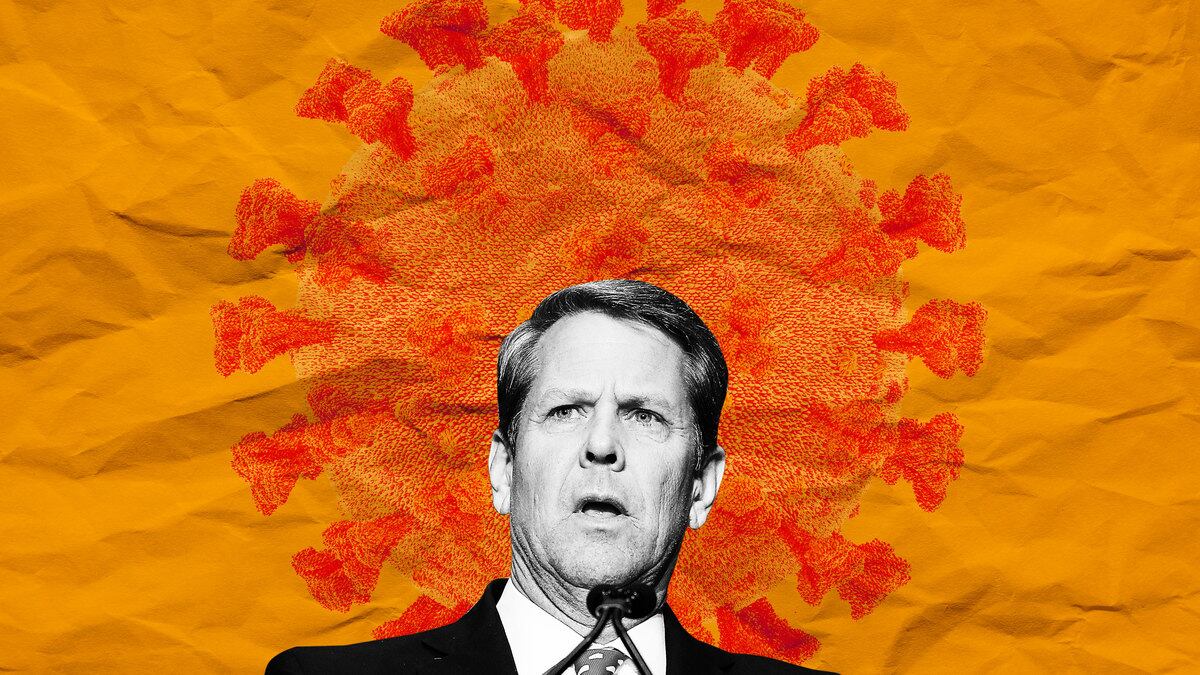SAVANNAH, Georgia—Eileen Funderburk remembers when this city faced its first major coronavirus threat in March, and newly elected Mayor Van Johnson took the controversial step of canceling the city’s St. Patrick’s Day parade.
The event brings in hundreds of thousands of visitors each year. Many locals were upset with the decision, which came two weeks before Gov. Brian Kemp issued a statewide stay-at-home order. At that point, fewer than 700 Americans had died at the hands of COVID-19.
“He cancels the parade to stop an influx of thousands of people,” Funderburk told The Daily Beast, adding, “Johnson has had a sound plan from the beginning.”
Funderburk credits the move with saving the city from the same level of suffering seen elsewhere in the state: So far the city and surrounding county have recorded fewer than 200 cases and six deaths.
But on Monday, Kemp issued an executive order allowing some businesses like hair salons to open up as early as Friday, and restaurants next week. Adding insult to injury in the eyes of some locals, the order bars cities from enacting their own restrictions.
The governor’s aggressive push to fast-track reopening quickly sparked concern about a surge of COVID-19 contagion across the state, and late Wednesday drew a rare—if winking—rebuke from President Trump, who said he “totally disagrees” with Kemp’s order. But it’s especially troubling for Savannah, which is unique thanks to its status as a destination city that tourists flock to in the spring. Reopening restaurants and other businesses could persuade people to begin traveling here in larger numbers, possibly causing a spike in coronavirus cases in an area that has thus far avoided being hit hard.
The same can be said for Kemp’s lifting of the state’s stay-at-home order, which will now end midnight April 30.
“I was just out of my head angry about it and still am,” said Funderburk, a retired high-school principal who lives in Savannah’s historic district, the heart of the city’s tourism hub.
Johnson, the mayor, was similarly distressed at Kemp’s announcement.
“I think it’s reckless and dangerous for our citizens,” Johnson told The Daily Beast. “We’re something like 14th in cases of this virus and yet we have the seventh-lowest testing rate. It’s been very clear that the path to reopening is having at least 14 days of really flat or no movement in the number of cases and by expanded testing. Right now we’re nowhere near that.”
Johnson is still struggling with the rationale for Kemp’s decision—“I have no idea” why the governor enacted the order, the mayor said.
But there were a few clues being cited by residents of the city. Last week, as Georgia passed more than 850,000 jobless claims since mid-March, state labor commissioner Mark Butler suggested the unemployment trust fund could run out of money in six to eight months. Restaurateurs in Savannah worry Kemp’s order may at least in part be about saving the state money by reducing claims for workers whose employers have reopened their businesses.
That would make sense for the budget-slashing Kemp, who ran on a platform of severe austerity, fearmongering about immigrants, drastically restricting abortion rights, and, critics said, widespread, purposeful voter suppression. (A spokesperson for the governor did not immediately respond to a request for comment.)
Kemp’s decision also came as right-wing protesters besieged state capitols and governors’ mansions around the country to demand states reopen against all expert medical and scientific advice. “I don’t give a damn about politics right now,” Kemp said in announcing his order, which was immediately rebuked by Atlanta’s mayor.
Lawton Davis, health director of the Coastal Health District in Savannah, said in a statement that he believed the city’s shelter-in-place order put into effect by Mayor Johnson in early April had “made a positive difference in COVID-19 case rates in Savannah.”
“A flood of tourists to our area could certainly cause an increase in transmission of the virus,” he added.
Echoing their counterparts in Atlanta, some Savannah restaurant owners have already said they would ignore Kemp’s order allowing them to reopen. Mike Vaudrin, owner of the Ordinary Pub and several other restaurants, posted on Facebook that his businesses will not open on Monday, as allowed by Kemp’s order. The Grey, Mashama Bailey’s acclaimed restaurant, announced that it would remain closed “until further notice.”
Nick Wilbur, executive chef at Savannah’s Fat Radish location, told The Daily Beast many in the city’s restaurant community are resolute that now is the wrong time.
“I just think it would be irresponsible to open up, and I feel that it would just set us back,” Wilbur said. “There’s been no testing here, really. So having people go into an environment where it could spark back up again… It just doesn’t make any sense.”
Martin Sinderman, who owns Savannah Sidewalk Tours, bemoaned what he described as Kemp’s recommendation to practice social distancing while simultaneously allowing the opening of businesses in which that’s virtually impossible.
“To me, this wasn’t the time to relax the restrictions, especially on stuff like tattooing, massages, bowling alleys, and salons. I have a hard time wrapping my head around that,” Sinderman said. “It’s hard to cut people’s hair from six feet away.”
How to practice social distancing in a hair salon, theater, or bowling alley is just one of the many questions that remain following Kemp’s order for people across Georgia.
The future of unemployment is now completely up in the air, experts and local leaders said. Workers whose restaurants, salons, or theaters reopen may be presented with a stark choice: Return to work or risk losing benefits.
Michele Evermore, a senior policy analyst at the National Employment Law Project, a liberal research group, suggested workers may have to argue they face a “specific threat” to avoid returning to work and still collect unemployment. That is, it may not be enough to have general concerns about contracting the coronavirus.
“It’s a matter of legal opinion and that’s totally my concern,” Evermore said, adding that the state “can definitely deny” benefits for workers who choose not to return to work at businesses that reopen.
Wilbur said Savannah’s restaurant community was discussing what to do in the event that service workers’ claims are denied.
“It’s a consensus that we are not going to reopen,” Wilbur said of some in Savannah’s restaurant community. “And increasingly, there’s talk of, maybe we should all [be] thinking of mobilizing.”
In Savannah, Johnson and others will have to make those decisions as another burden looms: Spring is in full bloom, with temperatures reaching above 80 degrees under perfectly blue skies this week. Cars with out-of-state license plates from Tennessee, Massachusetts, Illinois, North Carolina, New Jersey, New York, and Maine line historic Jones Street, where Funderburk lives, and where soaring mansions have been converted to Airbnbs and bed and breakfasts.
Even though Kemp’s stay-at-home order remains in place until the end of the month, some businesses in Savannah will almost inevitably choose to open up, providing yet another draw to what Johnson calls “the most wonderful city in the world.”
“People have cabin fever, and I do think that they’ve been coming here when they’re not supposed to,” Funderburk said. “But as soon as they’re allowed to, they will, and we’ll be sitting ducks.”




